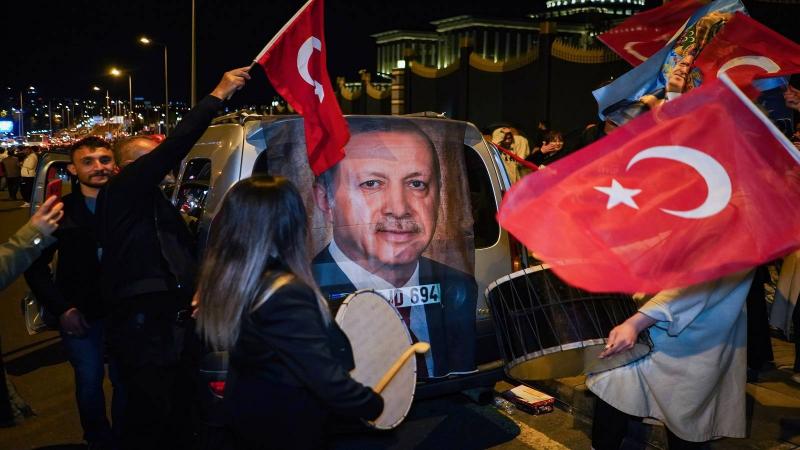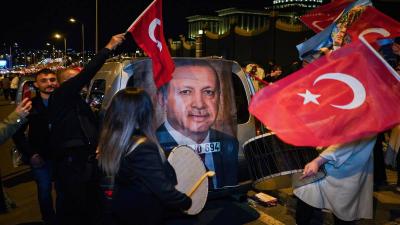Millions of voters in Turkey will head to polling stations on Sunday to elect mayors and administrators in local elections that serve as a gauge of President Recep Tayyip Erdoğan's popularity. This comes as his ruling party tries to regain control in major cities lost five years ago. A victory for Erdoğan's party could push the Turkish president to continue constitutional amendments that would allow him to remain in power beyond the end of his current term.
On the other hand, winning in major city municipalities could help rejuvenate the Turkish opposition, which has suffered from disillusionment and division following its defeat in last year's presidential elections.
### The Istanbul Battle
In the last local elections held in 2019, the opposition—after unifying—won in the municipalities of the capital Ankara and the commercial hub Istanbul, thereby ending the ruling party's 25-year control there. Losing Istanbul in particular was a significant blow to Erdoğan, who began his political career in 1994 as the city's mayor, which has a population of approximately 16 million.
Erdoğan has appointed Murat Kurum, the former minister of urbanization and environment (47 years old), to contest against the current mayor, Ekrem İmamoğlu, from the center-left Republican People's Party. İmamoğlu is seen as a potential presidential candidate against Erdoğan. A new conservative religious party, the New Welfare Party, has also entered the race, appealing to disappointed conservative and religious voters due to Erdoğan's handling of economic issues.
Polls indicate a close competition between İmamoğlu and Kurum, both of whom have promised infrastructure projects to enhance building resilience against earthquakes and alleviate the city's persistent traffic congestion. The opposition is widely expected to maintain its control over Ankara, where the current mayor, Mansur Yavaş, remains very popular.
### Erdoğan Seeks to Consolidate Power
To leave nothing to chance, Erdoğan has organized election rallies across the country and conducted campaigns on behalf of mayoral candidates. Analysts say reclaiming Istanbul and Ankara and performing strongly at the ballot box would bolster Erdoğan's determination to establish a new constitution that allows him to stay in office after 2028, when his current term ends. The current constitution limits the presidency to two terms. Erdoğan (70 years old) ran for a third term last year for procedural reasons as the country shifted to a presidential system in 2018, while his first term was under the previous system.
Additionally, analysts note that Erdoğan and his allies currently lack enough parliamentary seats to enact a new constitution, but another electoral victory may push some conservative opposition deputies to change their stance. Earlier this month, Erdoğan stated that Sunday’s elections would be the last for him under the current constitution. His critics see this as a ploy to secure votes and sympathy from supporters, as well as a strategy to push for constitutional amendments.
### Opposition Hopes for a Comeback
The opposition coalition of six parties, led by the Republican People's Party, has fractured following a bitter defeat in last year's elections. Supporters of the coalition have felt disillusioned after its failure to oust Erdoğan despite economic troubles and the aftermath of the earthquake disaster. The ability of the Republican People's Party to maintain control of the major cities it won five years ago could invigorate the party and allow it to present itself as an alternative to Erdoğan's ruling party. Conversely, losing Ankara and Istanbul to Erdoğan’s party could squelch Yavaş and İmamoğlu's presidential ambitions.
The Republican People's Party changed its leadership shortly after the electoral defeat, but it remains to be seen whether the new party leader, Özgür Özel (49 years old), can inspire enthusiasm among party supporters.
### Kurdish Votes
Kurds make up around 10% of the voters in Istanbul, and their votes could be crucial in the mayoral race. The Kurdish-backed party in Turkey, currently known as the Peoples' Democratic Party, supported İmamoğlu in the 2019 municipal elections, aiding his victory. However, this time the party is fielding its candidates, which could reduce the vote count for İmamoğlu.
Some observers suggest that the party has intentionally nominated less prominent candidates in an implicit endorsement of the current mayor. At the same time, the party is expected to win several municipalities in the southeastern regions of the country with a Kurdish majority. The question remains whether it will be allowed to retain them. In previous years, Erdoğan's government has removed elected mayors due to alleged ties to Kurdish militants and replaced them with state-appointed officials. During a massive rally in the Kurdish-majority city of Hakkâri on March 15, Erdoğan urged voters not to support individuals he claimed would divert municipal funds to a “terrorist organization,” referring to the outlawed Kurdistan Workers' Party (PKK).




